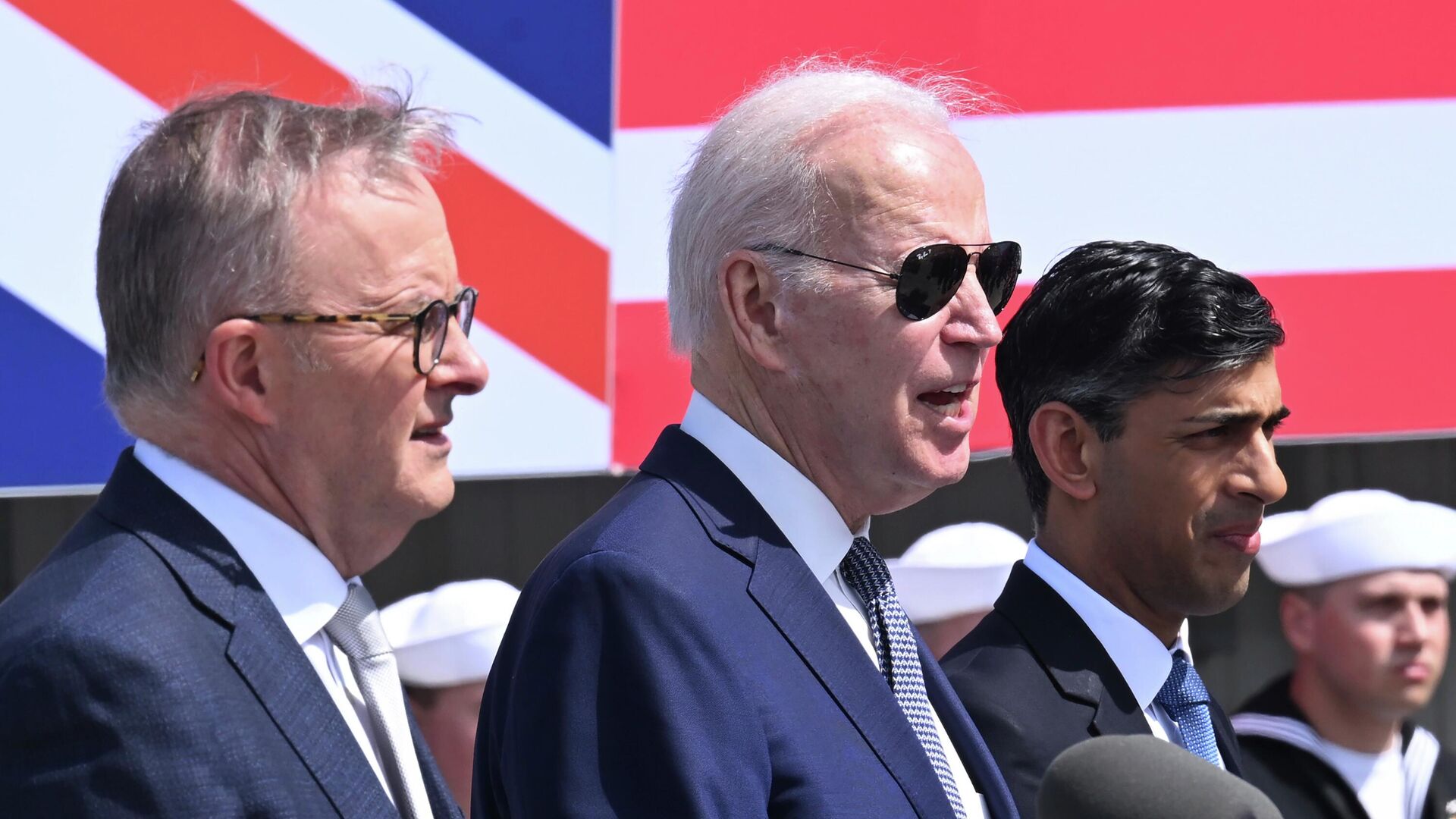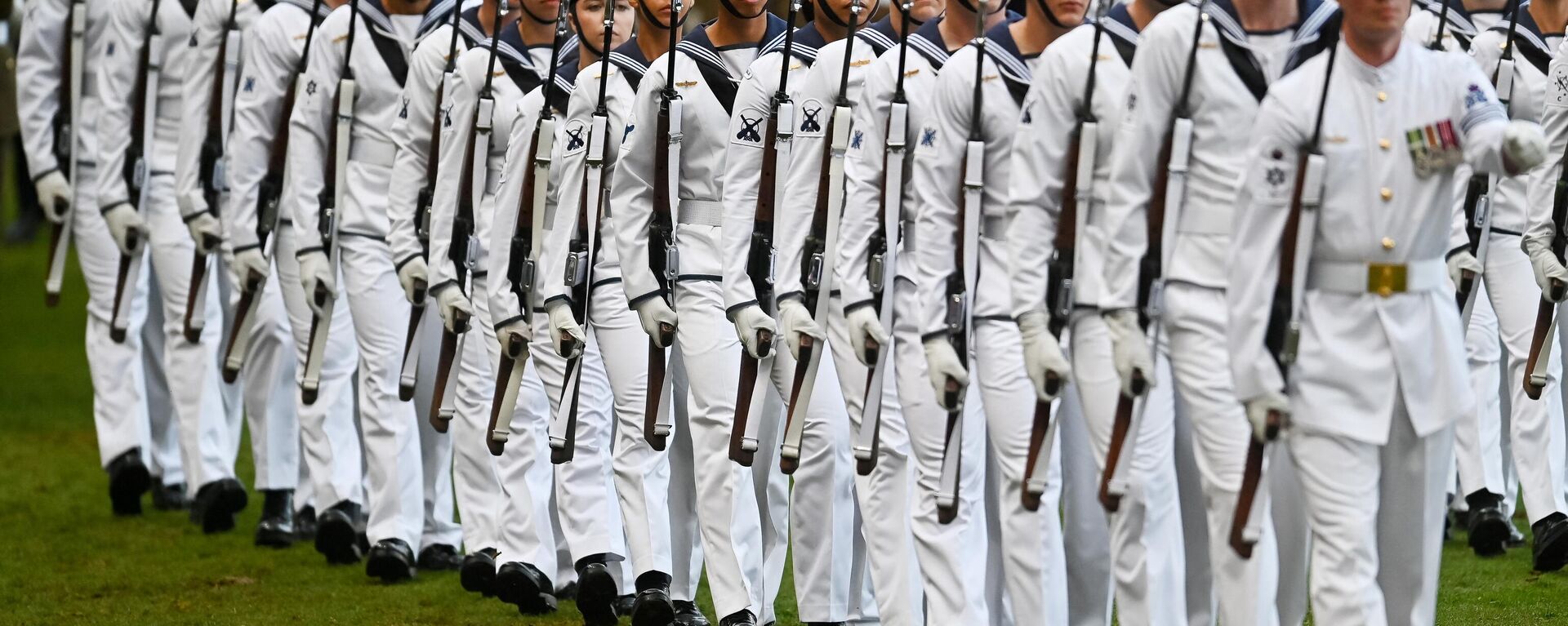https://sputnikglobe.com/20230724/us-militarizing-australia-for-conflict-with-biggest-trade-partner-china-1112106984.html
US Militarizing Australia for Conflict With Biggest Trade Partner China
US Militarizing Australia for Conflict With Biggest Trade Partner China
Sputnik International
Australia has only moved closer militarily to the US and its colonial mother-country the UK in recent years. Professor Joe Siracusa said that his countrymen found it hard to see another path in foreign relations.
2023-07-24T17:27+0000
2023-07-24T17:27+0000
2023-07-24T17:27+0000
asia
australia
china
taiwan
us
aukus
richard marles
defense department
vietnam war
washington
https://cdn1.img.sputnikglobe.com/img/07e7/07/18/1112107080_0:0:3000:1688_1920x0_80_0_0_b87195a5400ea5c1f310d5efeed9002b.jpg
Australia is sacrificing its lucrative trade relations with China on the altar of "security" cooperation with the US, says an academic.Australian Defense Minister and deputy PM Richard Marles announced on Monday that Canberra would buy 20 C-130J Super Hercules transport planes from US manufacturer Lockheed Martin for AU$9.8 billion ($6.6 billion).Meanwhile, the two-yearly Talisman Sabre army exercises kicked off on Saturday on Australia's northern coast, with more than 30,000 troops from 13 countries — led by Australia and the US — taking part.Professor Joe Siracusa told Sputnik that Australia had been in "lockstep" with US military planning over the previous two decades and was closely involved in Washington's increasingly aggressive stance towards China."Over the past 20 years Australia has developed interoperability with US forces, almost reaching the point of interchangeability" he said. "And in this particular exercise going on, it's a US-Australian exercise with other visitors, including the Germans and the Japanese for the first time, it's all signals to China to keep their hands off of Taiwan. Of course, the Chinese aren't buying that at all."The academic noted that Aussies knew accompanying the US on its military adventures had long been the price they had to pay for a close relationship with Washington.What the US offers Australia in return is "the ultimate guarantee of its sovereignty and territorial integrity." To ensure that, "Australians go just a little further than they have to go, because they think they're buying security down the road."But the "inherent contradiction" in that relationship is that China remains Australia's biggest export market."China is Australia's leading partner in all top three exports — our iron ore, coal and international students," Siracusa said. "In a sense, Australia weakens itself by doing this"However, "the military and the Defense Department here couldn't care less, they reckon the Australian economy can take a hit," he added. "It's contradictory, but they do it anyway until it hurts. The Chinese will probably make them pay a price for it. "The professor lamented that Australia was so far from finding an "intermediate position" between Washington's sabre-rattling and its place in the Pacific Rim economic region."Maybe one day Australia will become an interlocutor between the United States and China," Siracusa wondered. "But that's not likely right now."If the United States is engaged with China, Australia will be there on day one," he said, whether in Taiwan or elsewhere. "I think if there is a conflict or miscalculation, it will come in the South China Sea and it will be centered around the idea of freedom of navigation, more like that than anything else," he predicted.
https://sputnikglobe.com/20230425/australias-defense-review-shows-its-readiness-to-side-with-us-in-possible-conflict-with-china-1109812413.html
australia
china
taiwan
washington
Sputnik International
feedback@sputniknews.com
+74956456601
MIA „Rossiya Segodnya“
2023
James Tweedie
https://cdn1.img.sputnikglobe.com/img/07e4/08/1c/1080307270_0:3:397:400_100x100_80_0_0_7777393b9b18802f2e3c5eaa9cbcc612.png
James Tweedie
https://cdn1.img.sputnikglobe.com/img/07e4/08/1c/1080307270_0:3:397:400_100x100_80_0_0_7777393b9b18802f2e3c5eaa9cbcc612.png
News
en_EN
Sputnik International
feedback@sputniknews.com
+74956456601
MIA „Rossiya Segodnya“
Sputnik International
feedback@sputniknews.com
+74956456601
MIA „Rossiya Segodnya“
James Tweedie
https://cdn1.img.sputnikglobe.com/img/07e4/08/1c/1080307270_0:3:397:400_100x100_80_0_0_7777393b9b18802f2e3c5eaa9cbcc612.png
aukus military alliance between australia, uk and us, us-uk-australian nuclear submarine deal, will australia sacrifice its trade with china for military ties to washington?
aukus military alliance between australia, uk and us, us-uk-australian nuclear submarine deal, will australia sacrifice its trade with china for military ties to washington?
US Militarizing Australia for Conflict With Biggest Trade Partner China
Australia has only moved closer militarily to the US and the UK in recent years. Professor Joe Siracusa, political scientist and dean of Global Futures at Curtin University in Perth, said that his countrymen found it hard to see another path in foreign relations.
Australia is sacrificing its lucrative trade relations with China on the altar of "security" cooperation with the US, says an academic.
Australian Defense Minister and deputy PM Richard Marles announced on Monday that
Canberra would buy 20 C-130J Super Hercules transport planes from US manufacturer Lockheed Martin for AU$9.8 billion ($6.6 billion).
Meanwhile, the two-yearly Talisman Sabre army exercises kicked off on Saturday on Australia's northern coast, with more than 30,000 troops from 13 countries — led by Australia and the US — taking part.
In September 2021, Washington, London and Canberra declared the tripartite AUKUS alliance, along with an agreement for the US and UK to sell nuclear-powered fast attack submarines to Australia — jilting an earlier deal with NATO ally France.
Professor
Joe Siracusa told Sputnik that Australia had been in "lockstep" with US military planning over the previous two decades and was closely involved in Washington's increasingly
aggressive stance towards China.
"Over the past 20 years Australia has developed interoperability with US forces, almost reaching the point of interchangeability" he said. "And in this particular exercise going on, it's a US-Australian exercise with other visitors, including the Germans and the Japanese for the first time, it's all signals to China to keep their hands off of Taiwan. Of course, the Chinese aren't buying that at all."
The academic noted that Aussies knew accompanying the US on its military adventures had long been the price they had to pay for a close relationship with Washington.
"Australia is all in with the United States," Siracusa stressed. "People say here for the last 50 years, beginning with the Korean War and the Vietnam War, that this is the premium that Australia pays for its policy to the United States."
What the US offers Australia in return is "the ultimate guarantee of its sovereignty and territorial integrity." To ensure that, "Australians go just a little further than they have to go, because they think they're buying security down the road."
But the "inherent contradiction" in that relationship is that China remains Australia's biggest export market.
"China is Australia's leading partner in all top three exports — our iron ore, coal and international students," Siracusa said. "In a sense, Australia weakens itself by doing this"
However, "the military and the Defense Department here couldn't care less, they reckon the Australian economy can take a hit," he added. "It's contradictory, but they do it anyway until it hurts. The Chinese will probably make them pay a price for it. "
The professor lamented that Australia was so far from finding an "intermediate position" between Washington's sabre-rattling and its place in the Pacific Rim economic region.
"Maybe one day Australia will become an interlocutor between the United States and China," Siracusa wondered. "But that's not likely right now."
If the United States is engaged with China, Australia will be there on day one," he said, whether in Taiwan or elsewhere. "I think if there is a conflict or miscalculation, it will come in the South China Sea and it will be centered around the idea of freedom of navigation, more like that than anything else," he predicted.




